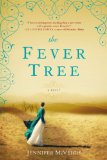Summary | Excerpt | Reading Guide | Reviews | Beyond the Book | Readalikes | Genres & Themes | Author Bio

The doctor stood perfectly still, almost a silhouette against the window, with the fingertips of one cupped hand resting on the corner of her desk. There was something coldblooded about him. Where the light caught the edge of his face, she could see his skin was sallow and drawn. He must have been up all night. He licked at his lips to moisten them. "I think he is suffering from nervous exhaustion."
"Nervous exhaustion?" She gave a small laugh. "You're sure it's nothing else?"
He didn't reply.
"I don't think you know my father, Dr. Matthews. He isn't the nervous type."
"They often aren't."
"And what, in your professional opinion, has brought this exhaustion on?"
"Miss Irvine, you should get some sleep." He touched her lightly on her upper arm. "There is no use in worrying."
She shivered, shrugging off his hand, which might have been there out of professional concern but seemed to assume an intimacy between them. She regretted not having dressed before coming down. "Thank you, but I'm all right."
Then after a moment, she said, "Dr. Matthews, what concerns my father concerns me also."
"I suspect I couldn't tell you anything about him that you don't already know."
Whatever Edwin Matthews might think, this wasn't necessarily true. There was very little she knew about her father's life outside the house.
"I should like to know if he said something to you."
"Your father and I talked—yes—but for the most part about mining in Kimberley."
"He has investments in coal?"
"No!" He gave a thin, dry laugh. "Diamond mining, and he didn't mention investments. Kimberley is in South Africa. I live at the Cape."
She flushed. Of course, Kimberley was the famous diamond-mining town.
"Who painted these?" Edwin had picked up the watercolors of her father's roses which were laid out on the desk.
"I did." The weather had kept her indoors, and she had spent most of the past two weeks at her easel in the morning room. There had been few visitors, and the time had been marked out by the tapping of her paintbrush as she cleaned it in the jar and the muffled voices of the tradesmen which drifted up from the kitchen below.
"They're very good." He was looking at her closely, as if adjusting some calculation in her favor, and she felt an old annoyance. This was the same arrogance he had had as a child, always judging the world according to his own criteria.
"Were you taught to paint?" he asked.
"A little." She shrugged. "But always portraits. I prefer to paint plants." Frances enjoyed the meticulous task of committing every detail—the veins, hairs, and shifts in color which most eyes failed to notice—to the page. The painting was always a compromise. It looked so little like the thing you painted, but its difference—the struggle for representation—was also its beauty.
She pointed to the cut blooms in a jar on the table. "My father's roses. They're lovely, don't you think?"
"Perhaps, but I have never liked domesticated plants. There is something excessive in their prettiness." He paused. "They seem decorative to a fault."
"But splendid nonetheless."
"I can't admire splendor if the cost is sterility." He gestured to her watercolors. "These roses are either grown from cuttings because they can't propagate themselves, or they are grafted onto the stronger roots of other plants to help them survive. They have to be nurtured by the careful gardener in a perfectly controlled environment. Monstrosities, Darwin has called them. Deviations from their true form in nature."
"And if they were left to grow in the wild?" she asked, curious.
"They would either die or revert back to their aboriginal stock." He put the pictures down and said, "I should leave you to rest." As he walked past her towards the door, she stopped him, not wanting him to go without some kind of explanation.
Reprinted by arrangement with Amy Einhorn Books/Putnam, a member of Penguin Group(USA) Inc., from The Fever Tree by Jennifer McVeigh. Copyright © 2013 by Jennifer McVeigh.
Your guide toexceptional books
BookBrowse seeks out and recommends the best in contemporary fiction and nonfiction—books that not only engage and entertain but also deepen our understanding of ourselves and the world around us.